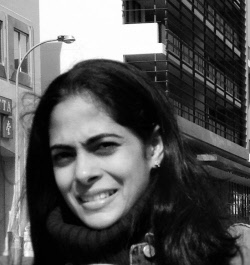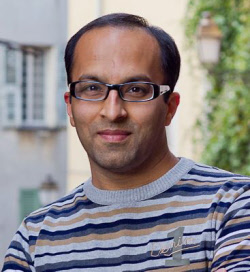An interview with Preeti Madhusudhan.
As a child, were you drawn towards writing? Or is it something that you began pursuing seriously much later? What sparked the interest?
Knowing my father was an author (who wrote under the pseudonym Deepaprakasan) was a background knowledge I grew up with. He gently nudged my brother and me towards reading, simply by sitting down to read. The first story I wrote was a version of “Goldilocks” when I was around 8. My aunt slipped the piece of paper in a plastic file-folder and proudly displayed it to her friends. After that I just read a lot and didn’t write until I was 13 when I started writing reviews of concerts as part of my school work. The Dean of the school, Mrs Y.G.Parthasarathy, a renowned educationist in Chennai, used to write her appreciative comments on the margins of the review and send them back to me. I then wrote a couple of short stories in Tamizh, as I used to read my father and his contemporaries, Sujatha and Asokamitran. But I stopped again, writing only while pursuing my Masters degree. I wrote a rather long, short-story in Tamizh inspired by something my mother-in-law mentioned while talking to me. This was published in the Tamizh monthly Amudasurabhi. So, I would say that the love for words has always been there, though I hadn’t pursued it as a habit till recent times.
How much of what you write is influenced by personal experiences (particularly stories)? What among these experiences do you generally choose to write on?
I would say that almost all of it is based on personal experiences. It is not always a particular incident, but most often a phrase or a train of thought. I love listening to people. Some people have a natural story-telling ability, others a unique manner of expressing themselves. For example, the word “epiphany”, uttered by Joseph Campbell was the inspiration for “Epiphany”, one of the stories I wrote for Spark. If a certain word, facial expression or a train of thought makes me involuntarily write a couple of sentences, I go ahead with a story around it. Travel, of course, is an immense inspiration for any writer. People, their appearances, clothes are all of interest to me. There is no better place than the lobby of a concert hall, movie theatre, a mall or an amusement park to watch people. It brings about either the most genteel or most rowdy of behaviours. So even if it is just a chance utterance that starts a story, it is a collection of personal observations that supplies the details. The way my husband looks when he composes a shot – waiting till everything is perfect, my son’s exuberance, my mother’s warm hands and graying hair, my niece’s coos of unconditional love, the dimple in my mother-in-law’s cheek, my brother’s boisterous laughter, everything leaves a mark. And they all find their way into any story as details, that grip me when I am writing them.
We have read and published some elaborate non-fiction from you. What about this form of writing do you enjoy?
While pursuing my Masters degree, I had to write long reports for various submissions as part of the course. I was studying urban planning and regional development. Though I liked the subject matter, writing on them became dry, uninspired jobs unless I figured out a way to enliven it for myself simply by changing the way I collected my thoughts and presented them. My Professor there, Asha Weinstein, by encouraging my style and correcting my mistakes with strict discipline, initiated my spark for writing. My husband’s habit of guiding my thoughts towards an endless stream of topics, has helped me streamline my thoughts in a cogent manner. I mentally finish composing entire paragraphs while talking with him. Non-fiction allows me to present my views on the subject, with an opportunity to do research and learn more. So more often than not, I know more about the subject after I have written the piece.
What, according to you, are the characteristics of good writing?
I don’t know if I have enough experience to judge. But from what I enjoy reading, as long as someone convinces the reader to finish reading what he has written, he is a good writer.
Are there any authors who have had a heavy influence on your writing style?
I love to read, so undoubtedly there are bound to be numerous influences like Jane Austen, R.K.Narayan, P.G.Wodehouse to name a few. But the one who has had the most impact on me is Somerset Maugham.
We know that you have written a novella in English and are trying to get it published. Could you tell us more about it?
“Golden Cupolas” is based on a collection of personal observations and experiences on the chaos that the youth in India lived through after the mandal-commission report and its impact on caste- based reservations in educational institutions. The protagonist, a young artist having lost his mother in an accident triggered by caste-based discrimination, sets off in pursuit of peace and reconciliation with his lost faith in the morals of the religion he grew up with. The story bounces back and forth between the perspectives of the principal characters, with each new character starting his own new narrative and carrying the central story forward.
Lastly, we are curious to know how you found Spark! How has the experience with Spark been for you as a writer?
I read an article by Jenani Parthasarathy in Spark and that is how I found you. I discovered my love for short-story writing through Spark. You have guided my writing with your minute editing, attention to details and keen comments that tell me when I have gone astray. Spark is an exciting platform, a healthy field for any budding writer to grow. It has been so for me.
Questions by Anupama Krishnakumar







Great !!!!